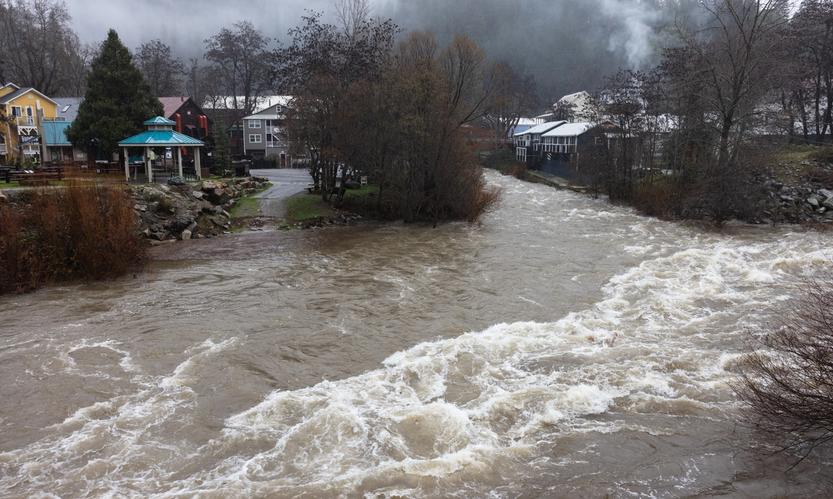My Mom: Timid Warrior, Part 1
By Lydia Cartwright Rosen
February 22, 2024
Taken with permission from Mountain Springs My mother was an alarming amalgam of contradictions. Beating beneath the pinafore top of her apron was a warrior’s heart. Like her birthplace in the northern Sierra Nevada, she was granite and iron laced with gold. She was an earthy country girl with a slight city sheen. She was a wildflower, a river rock, a skitterish doe who could become a fierce mountain lion of a mother when she had to. She was a strange mix of spirituality: raised a Christian, yet owing to her Scottish background, she was awash in superstition. In a typically confusing mix of both influences, she would admonish us, “Put scissors and knives away before bedtime so the angels won’t cut themselves.” Her favorite aphorism that saw us through the worst of times was, “It’s always darkest before dawn.” She was tender and consoling, with a surprising memory for historical scandal. In her later years she kept misplacing dollar bills hidden all over her house, yet maintained an encyclopedic memory for names, events, and entire family histories from her youth in Sierra City. Stories of scandals she delivered with a sidelong twinkle, half hoping, I’m sure, to shock. Mother became the unofficial historian of Sierra City, someone the Kentucky Mine Museum called a “resource.” In her later years, people were always knocking on her door, often bearing gifts like ice cream and hankies, hoping to plumb her remarkable memory for knowledge of their own genealogies. My mother, born in 1901, had grown up a country girl with a fine mind. She was raised in a very strict, old fashioned way by parents who insisted she dress in dark long dresses in a time when women were beginning to demand more practical and comfortable clothing. For some reason, a rigorous school system had found its way into these remote mountains, and my mother was schooled in subjects that ranged from Greek myths to trigonometry. She loved literature, especially poetry, and under the tutelage of a beloved French teacher, staged wonderful plays for the town, all in French. In 1915, when she went to stay with cousins who had left the mountains for San Francisco, the teachers at Polytechnic High didn’t know what to make of this shy country girl in her prim dark dresses who ran academic circles around her sophisticated peers. Mostly, though, her shyness remained dominant. She didn’t want to be aggressive; she preferred to be accommodating. When I was growing up in our drafty, “poor man’s Victorian” in Sierra City, furnished with marble-topped and time-worn antiques, cut glass dishes that only gathered dust, only wood stoves for cooking and heating, and very little money, my mother was endlessly inventive in her efforts to be accommodating. I had no idea that she was that way because we were poor. When I was a young child I thought that that was how people lived. When they wanted or needed something, they made it. For instance, almost every Halloween of my childhood, I won the prize for best costume. Each one was a product of our combined creative efforts. First we brainstormed for what was suitably haunting that year. Then came a rush upstairs to dig among old steamer trunks for mysterious dark capes and exotic hats, cast-off airy formals from our city cousins, gigantic Alaskan bear fur gloves and socks that seemed to be cast-offs from Bigfoot, ancient long underwear, and yards of amber velvet because my grandmother had had a habit of saving everything, and my mother hadn’t yet disposed of it all. Envying my two older brothers’ twelve-foot stilts, I longed for a pair of my own. My mother was a little like her father, who was a poet and also a fine carpenter. She knew all about lathes, files, braces and bits, and, utilizing her odd bag of skills, built me my very own stilts. They were admittedly somewhat crude, but they worked, they were mine, and I cherished them. My mother also inherited certain skills from my grandmother that she applied in her own singular way. When my mother was growing up in Sierra City, my grandmother had gained a reputation as an excellent midwife. Mountain Springs can be purchased at the Downieville Historical Museum, Sierra Country Store in Sierra City, Bassett’s Station, Graeagle Store, or directly by emailing lcrosen@yahoo.com.
Featured Articles

Storms Bring Heavy Rainfall and Local Disruptions →
December 22, 2025
Sierra County faces power outages and water issues amid heavy rainfall and storm warnings.
215 Animals Seized for Cruelty from Grass Valley Property →
December 22, 2025
Human Remains Found Near South Yuba Bridge in March Identified →
December 17, 2025
Transfer Station Burn Suspended After Community Concerns →
December 16, 2025
Sierra Hardware Plans Extensive Repairs After Flood Damage →
December 8, 2025